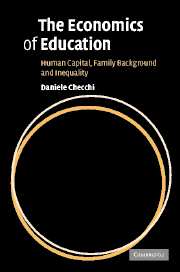Book contents
- Frontmatter
- Contents
- List of figures
- List of tables
- Preface
- 1 The relevance of education
- 2 The demand for education
- 3 Liquidity constraints and access to education
- 4 The supply of education
- 5 Education financing
- 6 The return on education
- 7 Intergenerational persistence
- References
- Subject index
- Author index
5 - Education financing
Published online by Cambridge University Press: 22 September 2009
- Frontmatter
- Contents
- List of figures
- List of tables
- Preface
- 1 The relevance of education
- 2 The demand for education
- 3 Liquidity constraints and access to education
- 4 The supply of education
- 5 Education financing
- 6 The return on education
- 7 Intergenerational persistence
- References
- Subject index
- Author index
Summary
Introduction
When Milton Friedman published his famous contribution on Capitalism and Freedom in 1962, he devoted an entire chapter to the role of government in education. He made a careful distinction between the public and private financing of education and its public (or private) provision, arguing that public financing could be justified on the grounds of neighbourhood effects (positive or negative externalities on other people) and/or paternalistic attitudes (concern for children of irresponsible parents), but that it would not carry over to vocational education, where private returns on increased skills would accrue to the individual. However, nothing could justify what he termed the ‘nationalisation’ of education provision, because this would reduce the parental freedom of choice. In his view, the role of government would be reduced to administering the allocation of publicly financed vouchers to families and to checking the existence of minimum requirements in approved schools.
While Friedman's analysis is stringent in its market perspective, it seems to neglect some aspects of education provision that we have already highlighted in previous chapters, in particular the existence of differences in abilities and/or in family backgrounds. Friedman viewed access to education as identical (or randomly different) individuals facing an investment opportunity, and objected to the public subsidisation of choices providing private returns. However, when individuals differ in several respects (family incomes, unobservable abilities, neighbourhood effects, and so on), there is no guarantee that market allocation would automatically provide the equality of opportunity outcome, not to say the most efficient outcome.
- Type
- Chapter
- Information
- The Economics of EducationHuman Capital, Family Background and Inequality, pp. 114 - 162Publisher: Cambridge University PressPrint publication year: 2006



